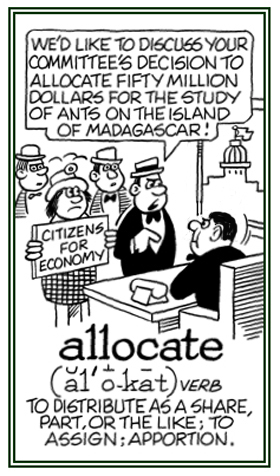loco-
(Latin: place; from place to place; where something is positioned or situated)
allocate (AL uh kayt") (verb), allocates; allocated; allocating
1. To set something aside for a reason or a purpose: The principal of the school allocated two teachers and three students to plan the end-of-school activities.
2. To distribute something according to a plan: The government agency announced a plan to allocate millions of dollars to purchase food supplies and medications for the storm-hit community.

© ALL rights are reserved.
Go to this Word A Day Revisited Index
2. To distribute something according to a plan: The government agency announced a plan to allocate millions of dollars to purchase food supplies and medications for the storm-hit community.

Go to this Word A Day Revisited Index
for a list of additional Mickey Bach illustrations.
A system, procedure, or process of distributing or sharing by setting something aside: The allocation of the food for the poor will be put into effect the following month.
allow
allowable (adjective), more allowable, most allowable
1. Concerning something that is permissible; tolerable: Doug was sick on the day of an exam, so it was allowable that he could take it after returning to school again.
2. Pertaining to something which is worthy of being considered: The three inches extra in the cotton fabric were an allowable measurement in case of shrinkage after washing.
3. Referring to items that are deductible according to the law: The expenses that Mr. Straight had were allowable tax write-offs.
2. Pertaining to something which is worthy of being considered: The three inches extra in the cotton fabric were an allowable measurement in case of shrinkage after washing.
3. Referring to items that are deductible according to the law: The expenses that Mr. Straight had were allowable tax write-offs.
allowably (adverb), more allowably, most allowably
Concerning how something is permissible or acceptable: The students in class were allowably permitted to ask questions directed at the speaker in the auditorium of the school.
allowance
allowed (uh LOUD)
1. Permit someone to do something; let, give permission to; authorize, concede to, sanction, agree to, approve: "My salary does not allow me to live extravagantly. The teacher allowed us to leave school early."
2. Allocate, assign, grant, provide: "Allow yourself at least an hour to get to the airport."
2. Allocate, assign, grant, provide: "Allow yourself at least an hour to get to the airport."
collocate (KOHL uh kayt") (verb), collocates; collocated; collocating
1. A strong tendency to take place side by side with a frequency better than mere chance: A few words that collocate with each other include the following examples; "maiden" collocates with "voyage" or "maiden voyage"; "mortgage" collocates with "property".
2. To put words in a certain order or to arrange words naturally together : The word "college" collocates with "student" or "college student"; "quick" collocates with "temper"; however, "fast" does not collocate with "temper".
2. To put words in a certain order or to arrange words naturally together : The word "college" collocates with "student" or "college student"; "quick" collocates with "temper"; however, "fast" does not collocate with "temper".
1. The association between two words that are typically or frequently used together: Such words as "strong coffee" and "heavy drinker" are typical English collocations; as well as, "bosom buddy" and "dead serious".
2. An arrangement in which things are placed next to each other or close together: The artist made a collocation of certain pieces which formed a sculpture.
2. An arrangement in which things are placed next to each other or close together: The artist made a collocation of certain pieces which formed a sculpture.
Clare saw the organized collocations of books on the shelves in the library.
couch (verb), couches; couched; couching
couchant
disallow
disallowable (adjective), more disallowable, most disallowable
Capable of being rejected, dismissed, or prohibited: Jim was caught with disallowable expenses for tax write-offs and had to pay a large fine.

